Some Google Searches I, a San Francisco Parent, Have Done In the Past Week
I’m sleeping great, how about you


I’m sleeping great, how about you
Ten years ago, protesters took to the streets to slam San Francisco’s Super Bowl City and call for an end to homeless sweeps. As the game returns to the Bay this week, why are things so quiet?
This week we've got dunes, vintage animation, fonts, and paper fruit.
In two quiet Bay Area towns, organizers for Palestine are getting loud — and forming deep friendships along the way.

On a recent early evening in Albany, a tiny suburb tucked between Berkeley and El Cerrito, a group of protestors — many of them retirees — stood on the four corners of a busy intersection, Marin and San Pablo Avenues. Waving large Palestinian flags, and wearing baseball caps and earrings with watermelon symbols, they raised their fists in the air as honking cars passed them by.
“When we first started doing this, we would get a honk from one out of 40 cars, maybe. Now, it feels like one in 10,” said Barry Preisler, a longtime Albany resident and retiree, as he held a banner in front of a Shell gas station with his wife, Haiganoush Preisler. “These days, there aren’t as many middle fingers.”
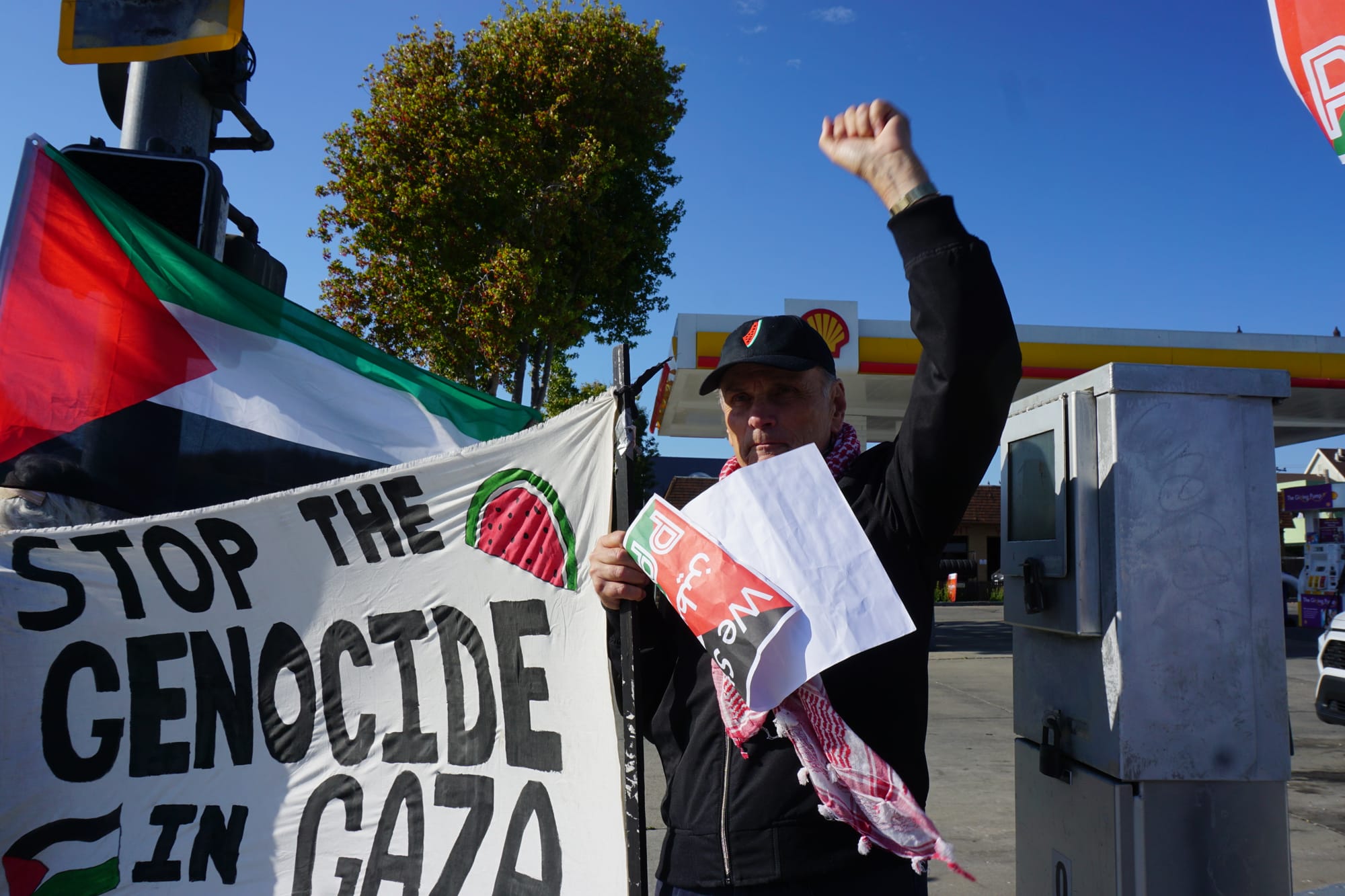
The continuous chorus of beeps and cheers from passerbys — including a postal worker who repeatedly honked his mail truck at the stoplight until it turned green — offered anecdotal proof that public support for Palestine has grown in recent months, a trend reflected in a recent Gallup poll showing that U.S. sympathy for Israel has also waned to its lowest point in a quarter century.
The shift has invoked a mix of emotions for many pro-Palestine organizers who have been actively organizing in recent years. For some, there’s a renewed sense of urgency, now that they feel like their work is finally resonating. For others, there’s also a conflicted resentment about the belated show of support for Palestine. Many say they’ve been marginalized for speaking out, and have lost jobs and friendships.
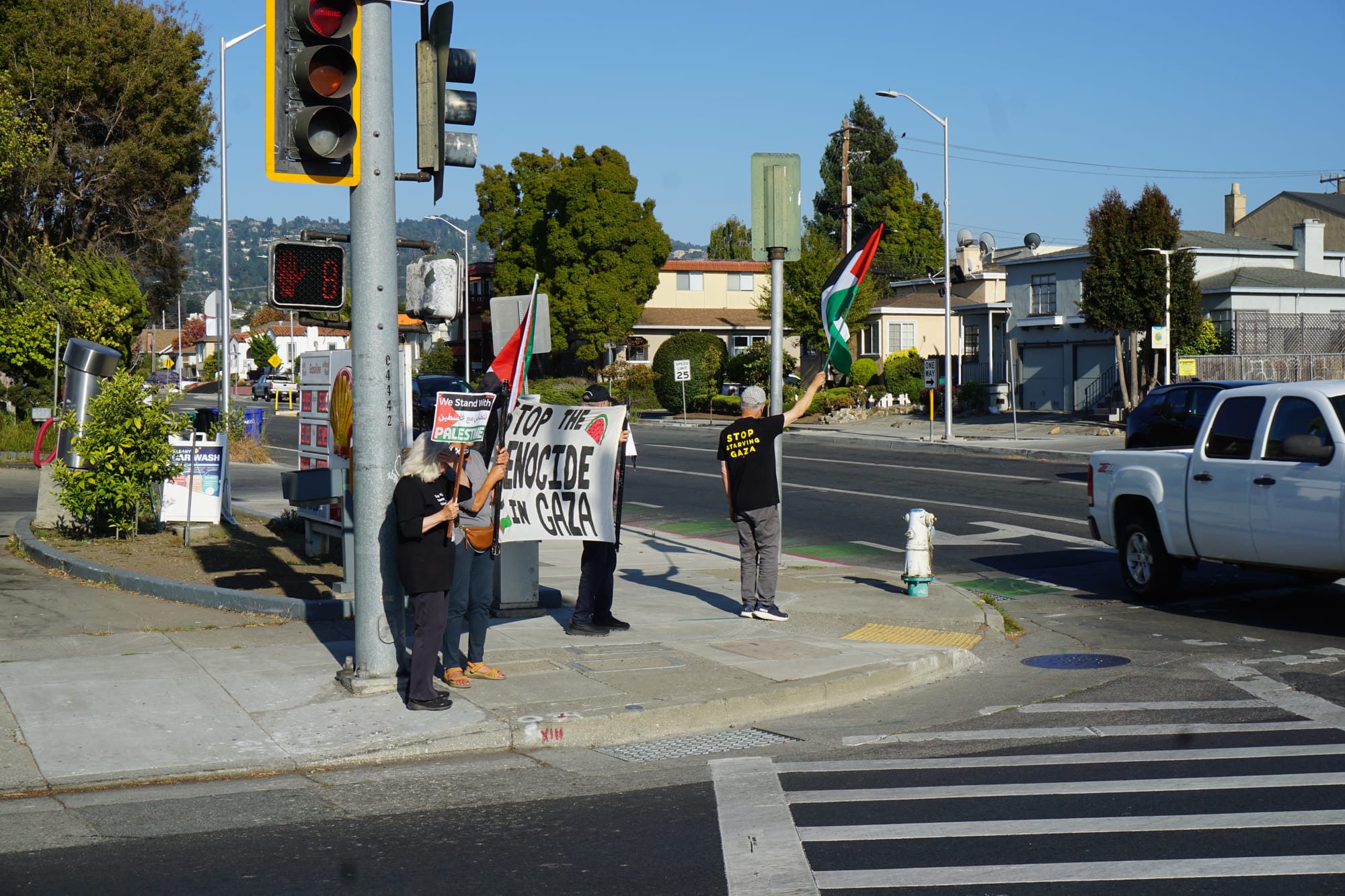
But for members of Albany and El Cerrito for Palestine, a grassroots group that the Preislers joined when the group officially started in the winter of 2023, hyperlocal organizing has yielded an unexpected outcome: deep bonds with one another — relationships they say have renewed and redefined their sense of community in the Bay Area.
Members say the group’s model for activism is organic: it’s multigenerational, prioritizes collective action and mutual trust, and is intentionally non-hierarchical. And, despite the devastation they’re protesting, they say the work is also full of joy.
Albany and El Cerrito aren’t exactly synonymous with protest — at least not compared to Berkeley or Oakland, their historically more radical neighbors. Instead, Albany and El Cerrito are better known for their suburban comforts: leafy streets and high walk scores, public schools that anchor families for generations, and clusters of mom-and-pop shops where retirees linger over coffee or parents stop for ice cream after soccer practice.
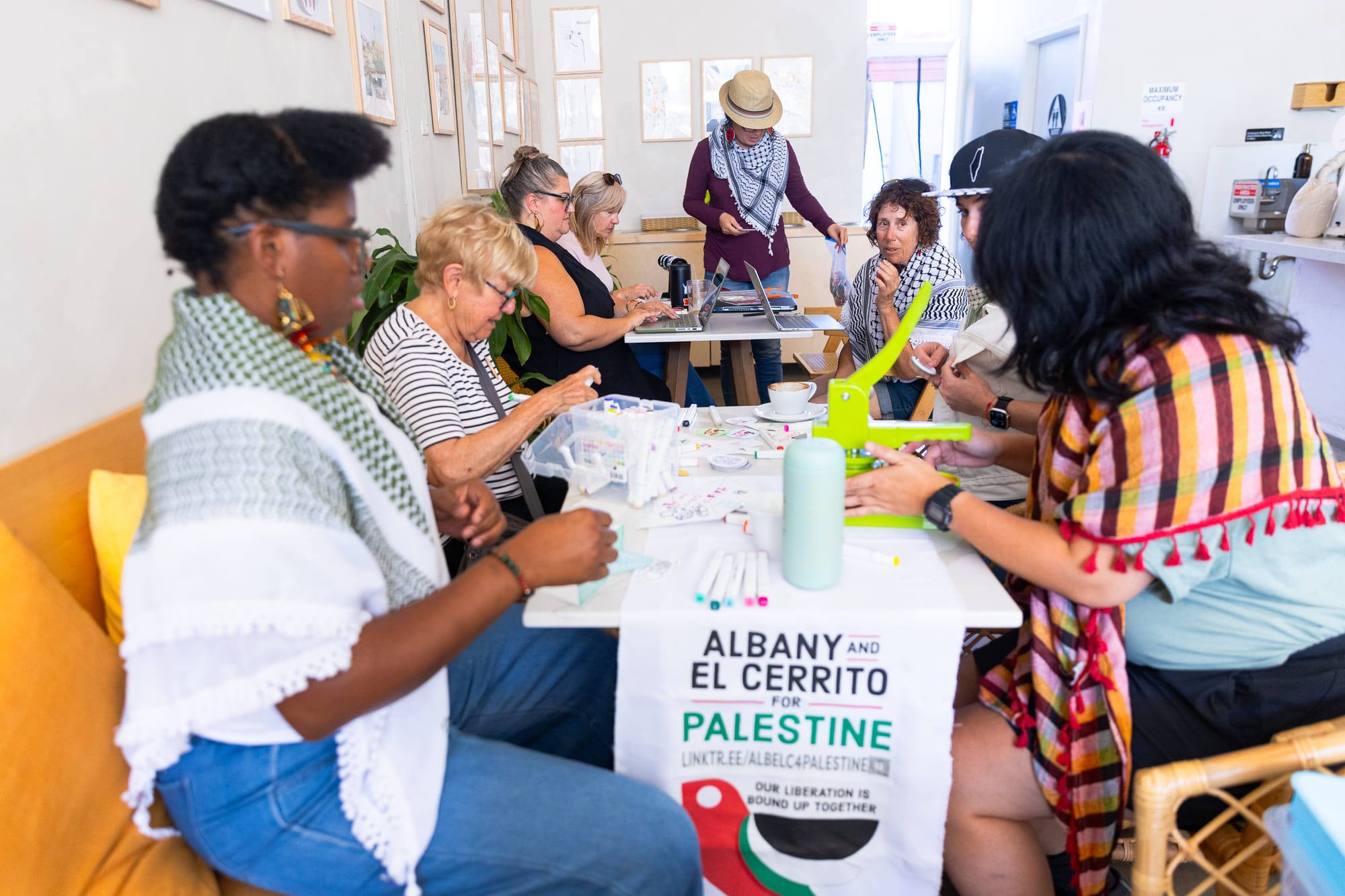
But over the past two years, these quiet, neighboring towns have buzzed with a different energy. Residents from each joined forces shortly after Israel launched its nearly two-year campaign of bombardment in Gaza in the fall of 2023. The ensuing strikes have killed over 64,000 Palestinians, including more than 200 journalists, as of this writing, according to the Palestinian Ministry of Health (several analyses state, though, that the figure is likely an undercount). Though widely framed as retaliation for Hamas’ Oct. 7, 2023 attack in southern Israel, Albany and El Cerrito for Palestine members reject that characterization and instead call it a genocide. It’s a view that has long been supported by a number of genocide scholars, as well as humanitarian and global organizations, including the Amnesty International and the United Nations.
Haiganoush, 75, is a Palestinian American who grew up in Beirut, Lebanon. She’s lived in Albany with her family for more than five decades. Though she and her husband had marched for causes over the years, she admits she was never deeply involved locally — until she joined Albany and El Cerrito for Palestine. As one of the early members of the group, Haiganoush says it has breathed new life into her activism. She’s participated in actions like banner drops at the Berkeley pedestrian bridge over the I-80 freeway and contributed to the group’s local fundraising bake sales.
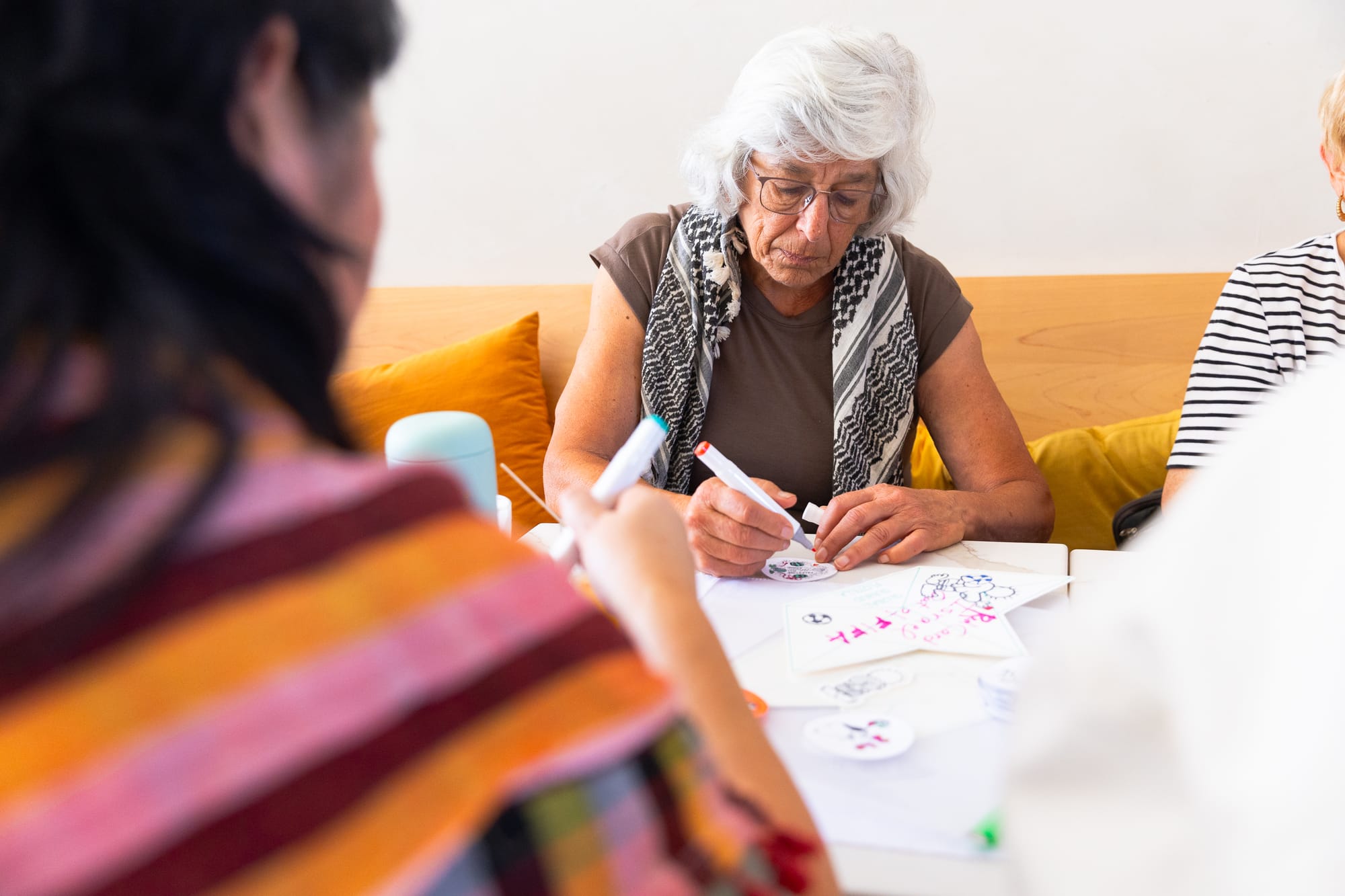
“Being a Palestinian, I have been involved with this all my life, except I was never really an activist to the degree that this group has made us,” she said.
In 1948, Haiganoush’s parents fled their home in Jerusalem when newly established Israeli forces launched a major offensive to establish the state of Israel, displacing hundreds of thousands of Palestinians. They were never able to return.
When Israel began attacking Gaza in October 2023, Haiganoush decided to be proactive, and advocated for the Albany City Council to pass a ceasefire resolution. She hoped that she could help the effort by telling her family’s story.
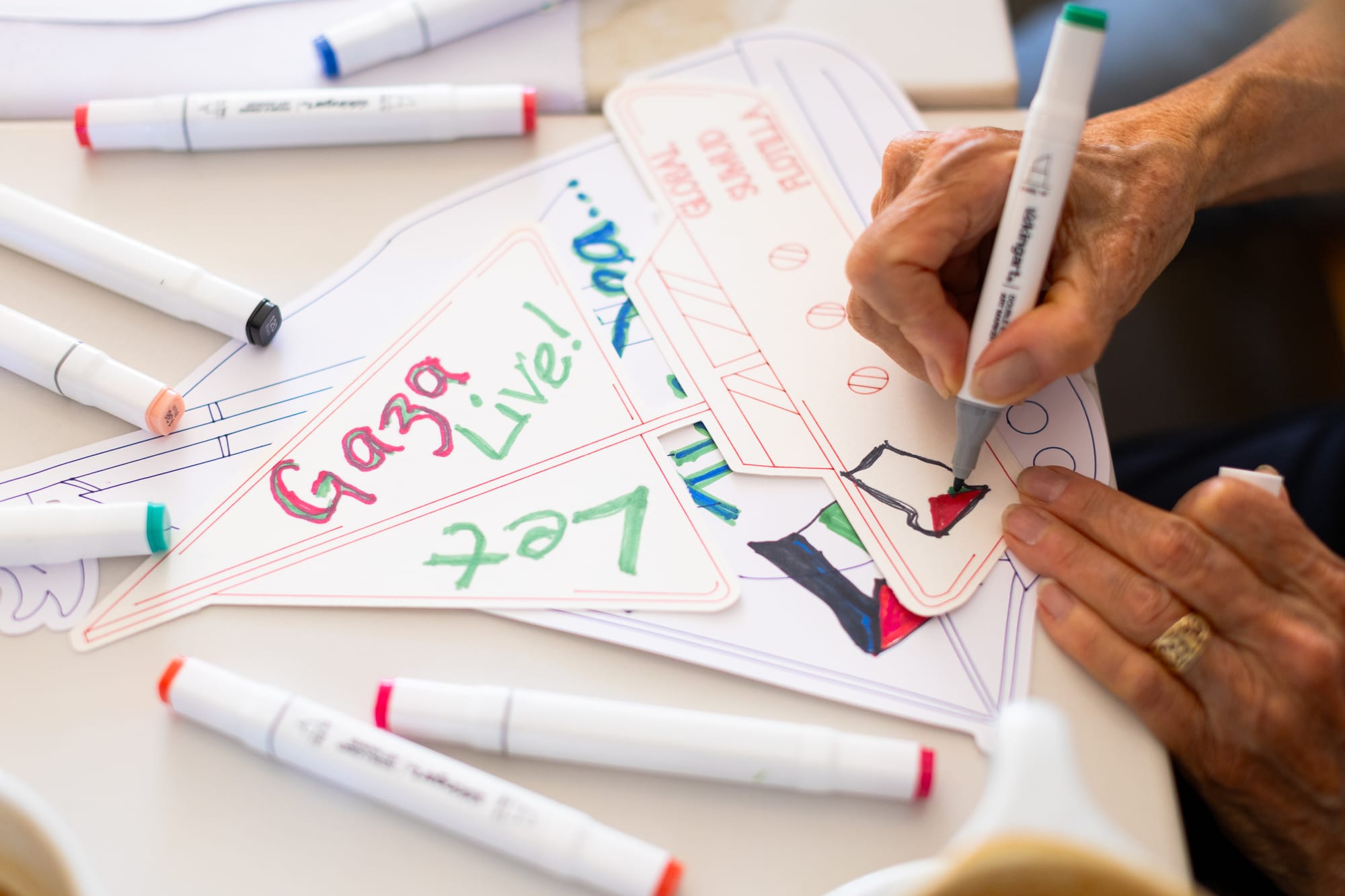
The campaign took months. Eventually, more residents joined the discussion and attended meetings until the city council voted 4-0 to adopt a ceasefire resolution last March. Albany joined other Bay Area cities that have passed similar resolutions, including nearby Richmond, as well as Oakland and San Francisco.
“We knew that it doesn't change [much] in the big picture,” Haiganoush said. “But it made us feel that, yes, with our involvement, we can do something.”
While Albany was successful in passing a resolution, its bordering cities Berkeley and El Cerrito were not.
One of the organizers behind the campaign in El Cerrito was 70-year-old Sherry Drobner, a Jewish American and longtime activist in the local community.
“We had different tactics and different results because of who the city councils were,” Drobner said, reflecting on the El Cerrito resolution not passing. She says Albany’s governance structure and leadership allow for more conversation and listening with residents.
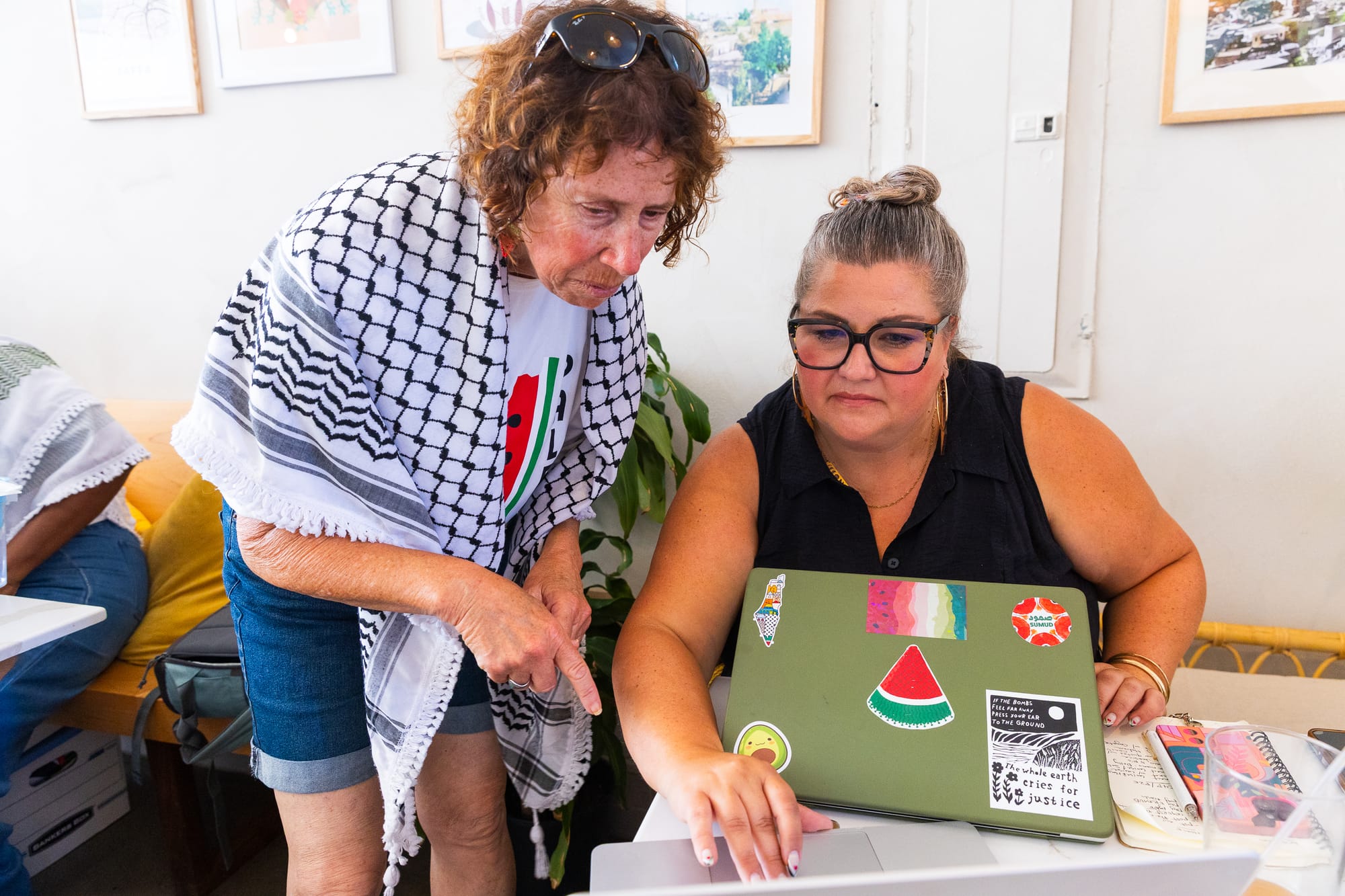
Nevertheless, despite the outcome, Drobner says the seeds of Albany and El Cerrito for Palestine were planted during the early stages of those resolution efforts, when organizers began connecting with one another, making plans for tangible actions.
There was a ceasefire march in January 2024, when residents walked a route that began in Albany and ended at the Daiso store in El Cerrito. Despite some clashes, including a controversial flag-burning, more than a hundred people gathered for the demonstration, signaling to early organizers of Albany and El Cerrito for Palestine that there was an urgent need for more hyperlocal pro-Palestine activism.
“After that rally, this group started forming,” Drobner said. People from both cities hopped on a large Zoom call and began strategizing. “We realized it made sense for these two smaller towns to work together.”
Some of the group’s first joint projects included asking Albany and El Cerrito businesses to hang ceasefire flyers in their windows, and handing out leaflets to drivers waiting at the El Cerrito Plaza stoplight. The strategy focused on education: sparking curiosity and nuance through one-on-one conversations.
Then the group grew bigger, more creative — and more ambitious.
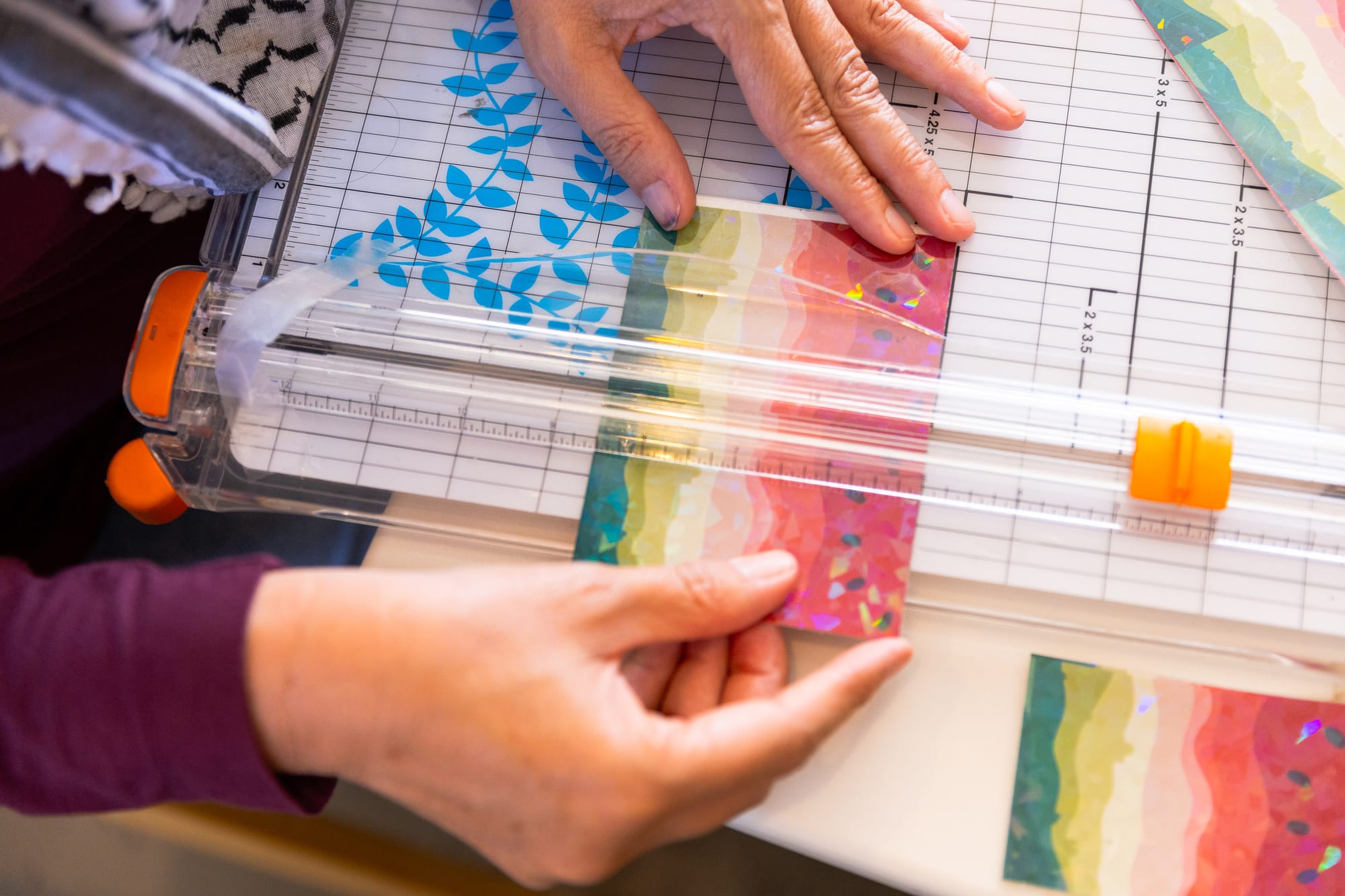
It’s been just under two years since the group formed, and members have organized an impressive number of protests and gatherings. In addition to tabling and co-sponsoring other pro-Palestine events, the group has planned film screenings, jewelry sales, “Baked Goods Not Bombs” bake sales, and a recent back-to-school “Buy Nothing” bazaar that took place in Albany’s Memorial Park, which raised $5,000 — its most successful fundraising effort yet.
Drobner estimates that the group has raised over $40,000, with members self-funding their own materials so that every dollar raised goes directly to organizations that are leading on-the-ground efforts in Palestine, including Project Hope Palestine, which distributes food and water supplies. (In August, the organization shared a post showing the direct aid from the group in action.)
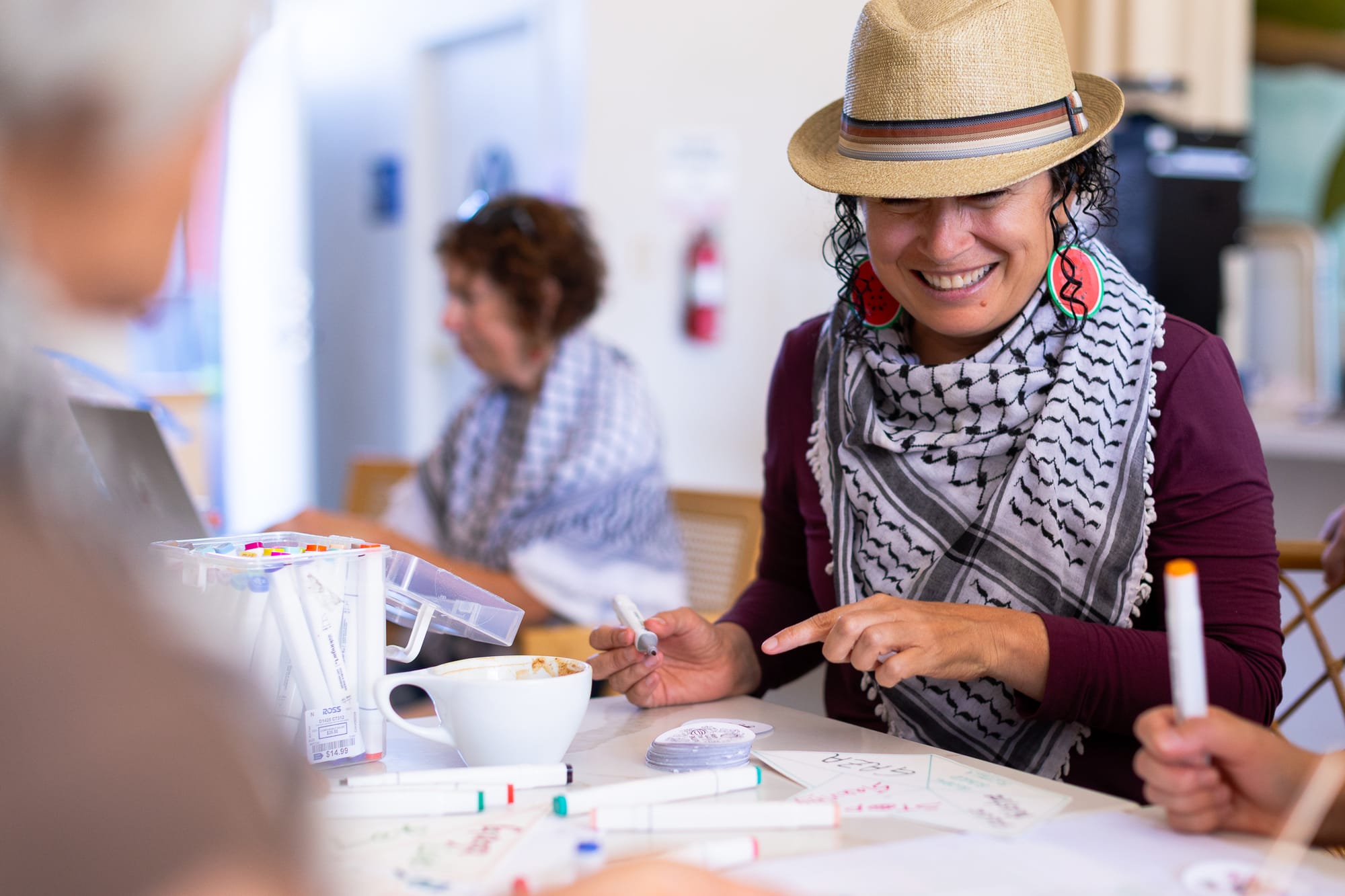
The group says it’s difficult to estimate the total number of participants since there are varying commitment levels. The group has about 500 people on its mailing list, with approximately 40 members who are consistently the most engaged in the group’s activities. Retired folks are some of the most active, public-facing members. For one, they have the time. And, crucially, they’re not risking professional opportunities, their livelihoods or family incomes by advocating for Palestinian rights, the way that younger members might.
The group has had to contend with argumentative, and sometimes aggressive, counter-protestors and Zionists. They’ve developed de-escalation strategies and security training methods so that members can feel prepared for inevitable tense encounters, and learn how to keep each other safe.
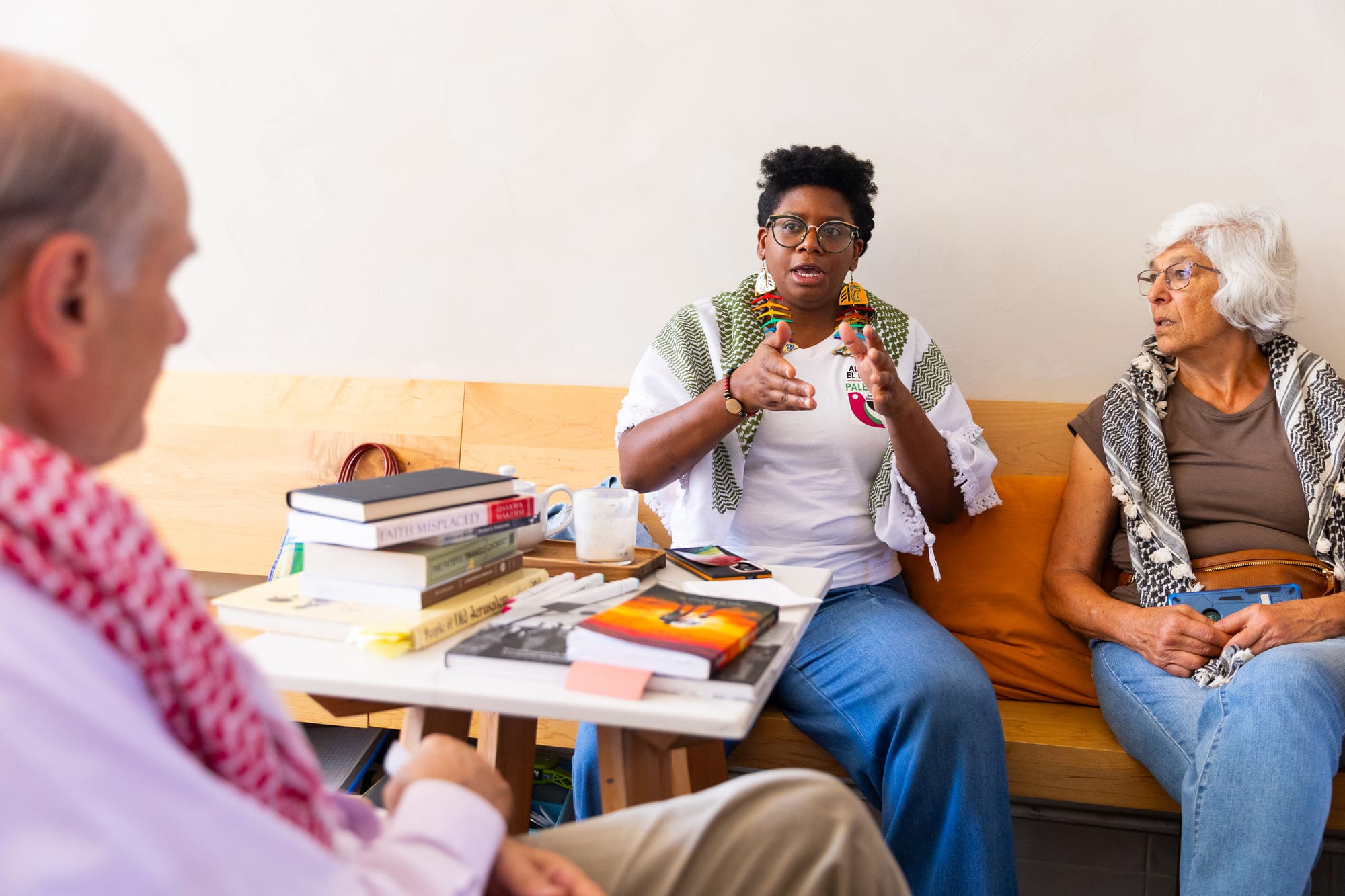
They put their preparation into action this past July, when Albany and El Cerrito for Palestine went viral with its biggest action yet: a “Tastes Like Apartheid” campaign that targeted El Cerrito’s Trader Joe’s, boycotting Israeli products sold on the store’s shelves. In addition to circulating a petition, the group sang inside the store as other customers and store employees looked on. They wrote original lyrics urging customers to join their boycott, singing to the tune of Plain White T’s’ “Hey There Delilah.” The video of the action has garnered nearly 280,00 views.
“I think we try to bring, in all this darkness, some joy and creativity in the work that we're doing,” Drobner said. “I'm just having a hell of a good time.” The group received a cease and desist letter from the store’s attorneys. Undeterred, they created “a Trader Joe’s toolkit” so that other groups can try similar actions in their own communities.
El Cerrito resident Nakiesha Koss first learned about the group last October, when she came across the group’s flyer taped to a window at Rialto Cinemas on San Pablo Avenue. She scanned its QR code and has been involved ever since.
The 45-year-old mother of a second grader says she discovered Albany and El Cerrito for Palestine at the right time in her life: she had recently moved from Marin and felt restless about what she could do for Palestine.
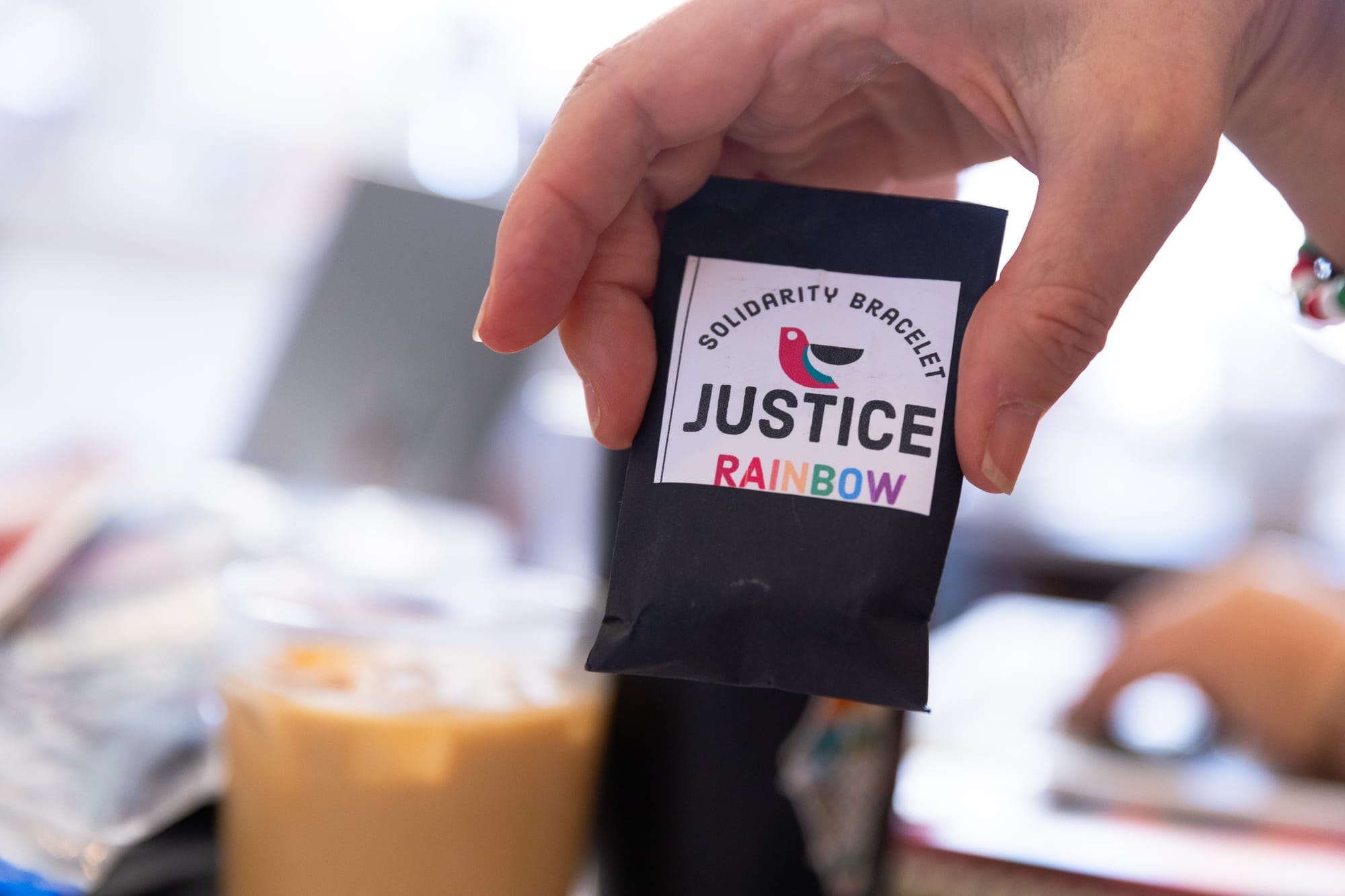
Koss comes from a family of activists, and although she’s participated in a variety of causes, including the Women’s March and Occupy Oakland, she struggled to find her own footing, or a home base for her activism.
“I’ve been looking for this for my whole adult life, really. And finally, I feel like I’ve found something,” Koss said.
She enjoys how organically the group mobilizes and takes action quickly, without a lot of bureaucracy or over-planning: “There's a lot of iteration and collaboration that happens that just keeps it feeling really juicy and alive. The localness of it. The fact that these are literally my neighbors… the people that I run into at the grocery store, at the coffee shop.”
While the community work keeps them busy, group members have forged authentic friendships and learned to reach out when they need help. They’ve navigated breakups, picked each other’s kids up from school, cat- and dog-sat. Members go on regular walks together and throw each other surprise birthday parties.
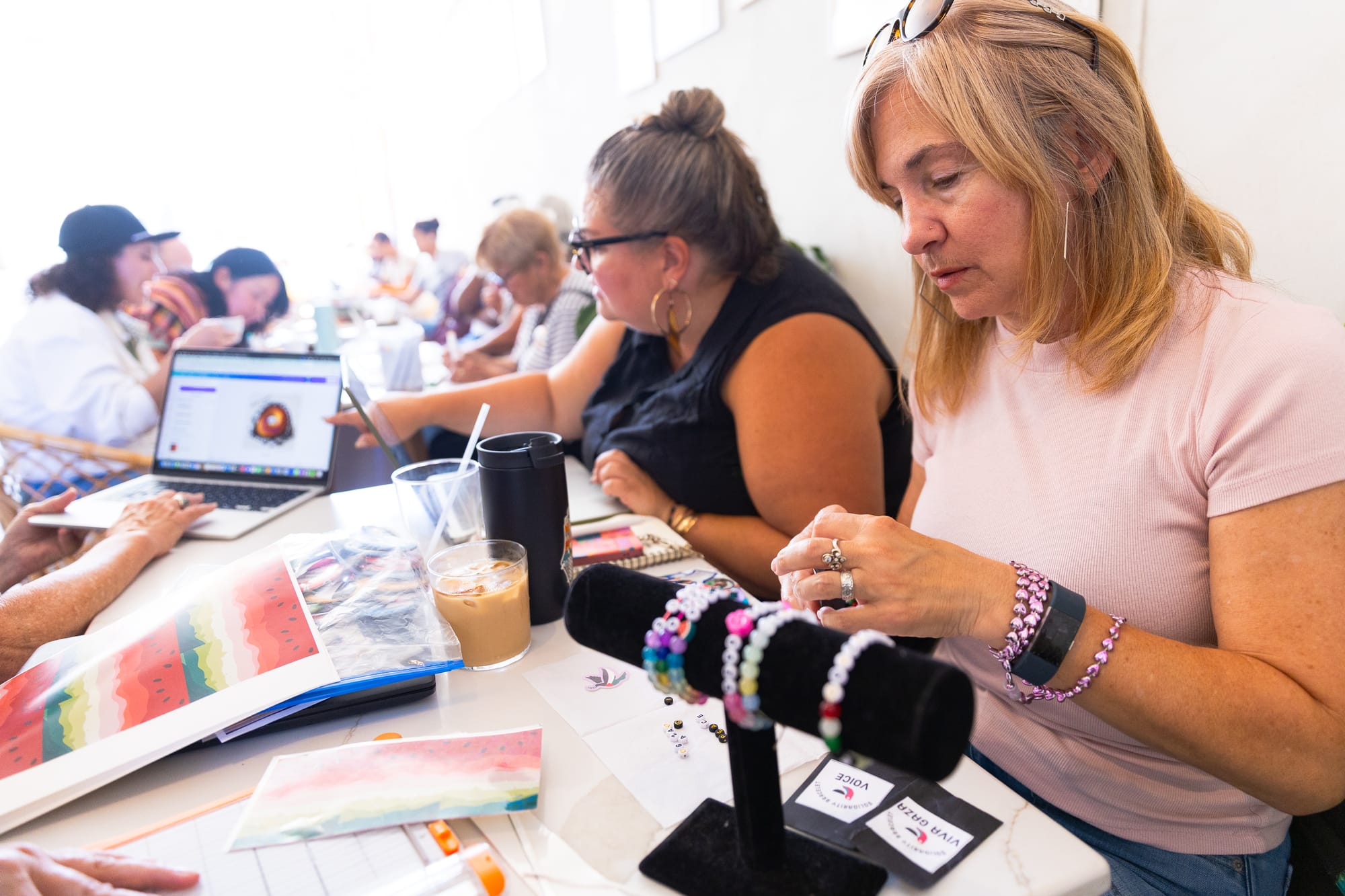
“Somebody will say they're not feeling well. And the next thing you know…[there are] all these messages like, ‘Shall I bring you soup?”... We’re really very, very supportive of each other in every sense,” Haiganoush said. “That's all new to me.”
Drobner says that’s part of what makes this group successful: “We are neighbors and we’ve become such good friends, and we created this kind of collective of mutual aid for each other,” says Drobner. “It’s just really amazing.”
As a single parent, Koss says she enjoys hosting members at her home each week so that her 7-year-old daughter can witness the multigenerational community. They call the restorative gatherings “kikis,” borrowing a term from ballroom culture. Here, it means Koss cooks dinner while members can commune and “experience the joy of being together and knowing each other and having each other,” said Koss.
The group also organizes skillshares, learning from one another outside of their work for Palestine. Together, they’ve done workshops on animation, sewing, honey-harvesting, and dance dabke (a Palestinian group dance).
As Albany and El Cerrito for Palestine continues to grow with new members, the group saw the need to establish shared focus and values, as well as a foundation of trust and safety.
Recently, Koss and a small sub-group of members developed guiding principles for the group, or what they call “points of unity.” Koss said the process took months of meetings, deep conversations and multiple rounds of drafts, in order to land on their final points — fewer than 20 definitive statements in all, each carefully discussed and chosen. Included are their assertions that they “do not question how Palestinians fight for their liberation and… their right to resist their oppression” and that they “believe that one’s liberation cannot be achieved at the expense of others’.”
Every new member that joins the group must agree with all points, otherwise they’re invited to find another group that’s a better fit for them.
“You can't really cherry-pick principles of unity. Because if this is something you really don't like, it's a risk down the road. It's going to be a real problem,” Drobner said.
Each month, the group holds onboarding events, which take place outside of Fat Apple’s, a homey diner in El Cerrito.
At their gathering at the end of August, about 10 interested residents showed up and were greeted by Albany and El Cerrito group members who wore keffiyahs and hung a Palestinian flag by the restaurant’s outdoor picnic tables. They nibbled pizza as the group discussed their work, and shared mutual griefs and frustrations about the devastation in Gaza.
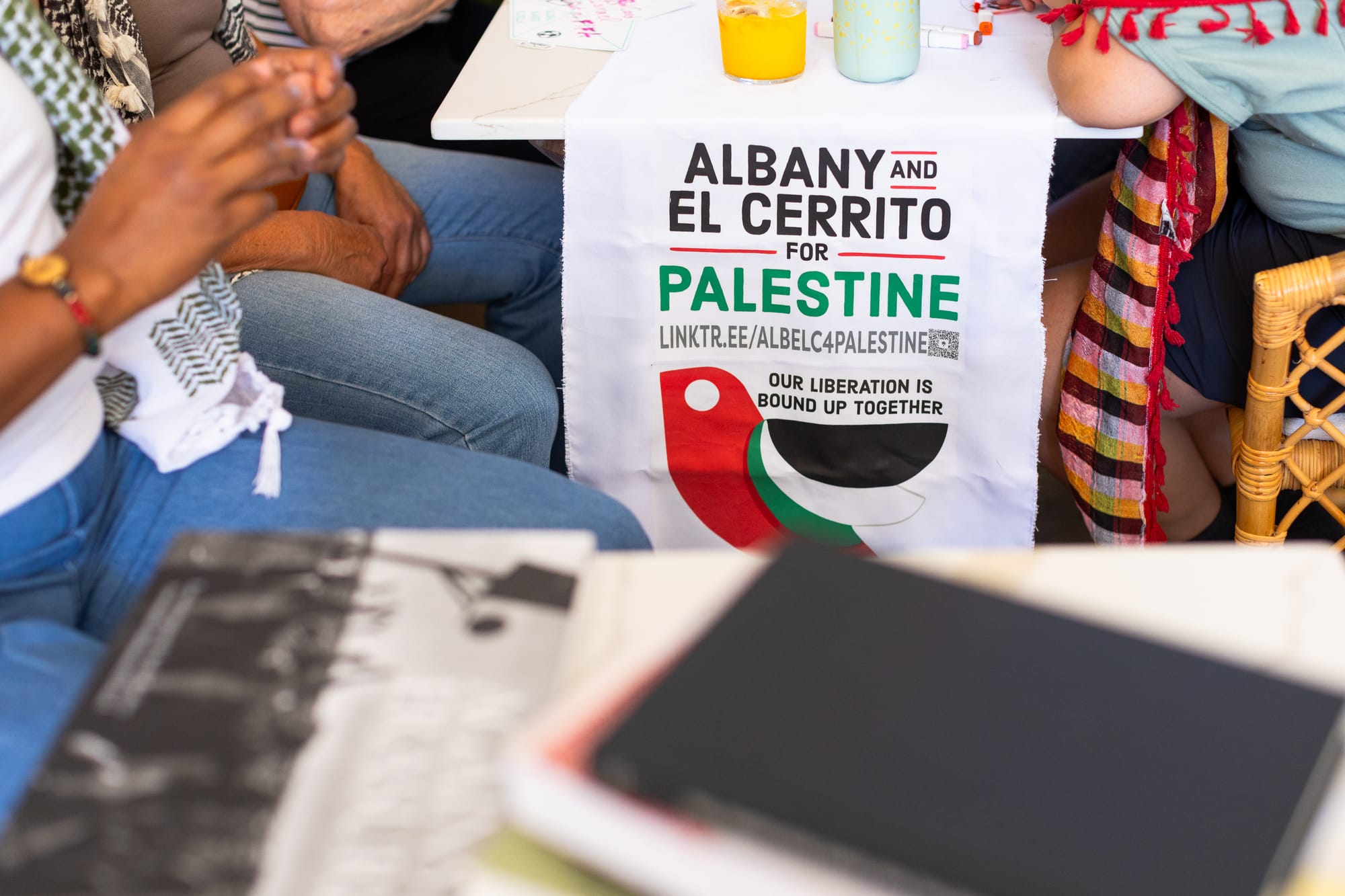
The newcomers included a couple in their 30’s who finally decided to come after over a year of seeing the group at local events, as well as young students — an El Cerrito High School junior and a recent college graduate who had participated in her campus’s student encampment.
One woman, a 34-year-old Albany resident who prefers to remain anonymous for fear of professional or personal retaliation, helped facilitate the gathering that day. She’s been involved since last June. Originally from the Midwest, she struggled to feel rooted after moving to the Bay Area in 2016.
“[This] is legit the first time in the nine years that I've lived here that I'm like, ‘this place is my home',” she said, her voice catching.
Through the group, she says she’s grown bolder — not just in her activism — but in the future she imagines for herself.
Inspired by the group, she’s taken initiative on other issues she cares about: She started an abolitionist caregivers group, and is dreaming of opening a community space in the future — ideas she says are encouraged and supported by her friends in Albany and El Cerrito for Palestine.
“I've heard people say [that] Palestine will liberate us all. And that is exactly how I feel… this movement for Palestinian liberation is collective liberation,” she said.
On Aug. 27, over a hundred pro-Palestine protestors were arrested for demonstrating inside the lobby of U.S. Sen. Alex Padilla’s San Francisco office. Drobner was one of them.
After being released from jail and returning home the next day, Drobner turned on her phone and was immediately greeted by a slew of supportive messages from Albany and El Cerrito for Palestine members on the Signal app, the primary messaging tool they use to communicate.
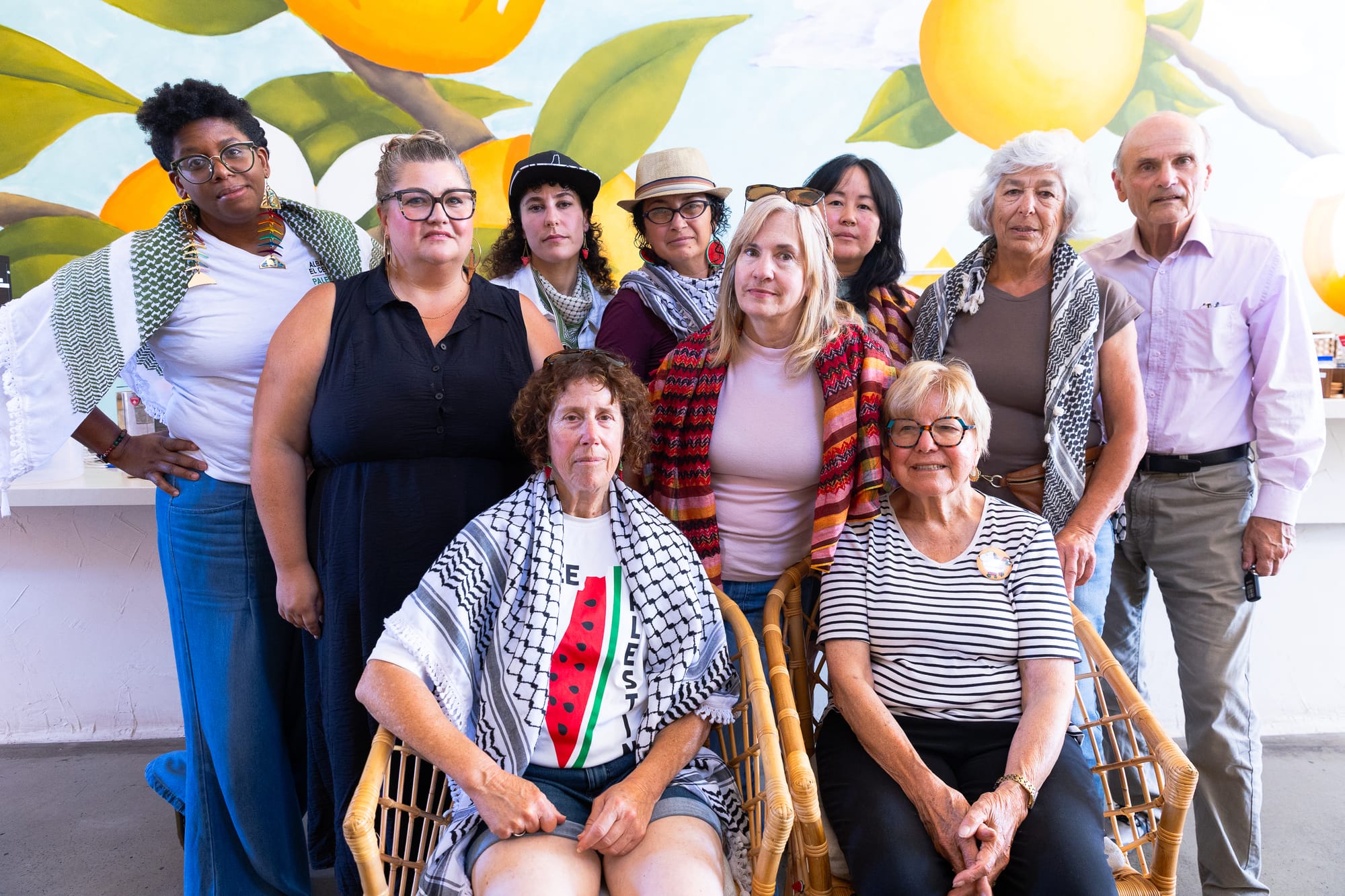
“They just made me feel really good,” she said with a teary smile.
That’s the kind of simple yet intimate support that Drobner says she hasn’t seen in her decades of organizing in other U.S. cities and parts of the world. For Albany and El Cerrito for Palestine members, one lesson of their organizing is clear: staying hyperlocal builds resilience that’s rooted in community care.
It’s regenerative. And, when replicated, it can ripple outward into broader change.
“If you want to maintain what you have… your aim isn’t to grow big,” Drobner said. “[The] goal is to replicate and have other people do it in smaller units as well.”
For the 34-year-old Albany resident who now dreams bigger about her own community work, the group’s impact feels lasting, too. The social infrastructure they’ve built, she said, is durable, no matter what comes next.
“Whether or not this amorphous, magical thing that we have right now continues in its [current] form, these relationships will continue, and our commitment to each other and our community is going to sustain,” she said.
Drobner says the joy of organizing alongside her neighbors has been its own reward. But she also hopes the group’s legacy is one of persistence.
“I want to say that we stayed the course,” she said. “We stayed the course, you know?”

Cecilia Lei is a reporter and producer, as well as an audio and live events host based in the East Bay. She covers immigration, the criminal legal system, AAPI issues, as well as other Bay Area communities.
View articles